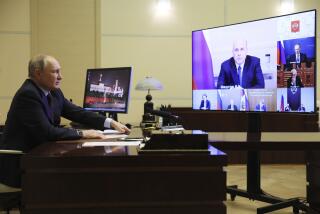Moscow Extends Nuclear Test Ban : Gorbachev Challenges Reagan to Join Total Cutoff at Coming Summit Talks
- Share via
MOSCOW — Soviet leader Mikhail S. Gorbachev said Monday that the Kremlin has extended the Soviet Union’s moratorium on nuclear testing until Jan. 1, and he called on President Reagan to agree to a total test ban at a coming summit conference. In an address carried by Soviet radio and television, Gorbachev said that the Politburo has approved extension of the unilateral moratorium on testing that the Soviet Union first declared on Aug. 6, 1985, and renewed twice since.
He said his government is confident that Moscow and Washington could agree to a permanent ban “this year at the Soviet-American summit meeting.” The comment seemed to acknowledge the Kremlin’s acceptance of a Reagan-Gorbachev meeting in 1986, although details have yet to be worked out.
Gorbachev said the decision to continue the Soviet moratorium was “guided by responsibility for the destiny of the world.”
U.S. Rejects Moratorium
In Santa Barbara, where President Reagan is vacationing, White House spokesman Larry Speakes rejected the Gorbachev moratorium proposal.
“Testing is needed to ensure the continued reliability, survivability and efficiency of our nuclear deterrent,” Speakes told reporters.
The United States has consistently refused to join the Soviets in a moratorium. The Reagan Administration argues that the Soviets have an advantage in missiles and that the United States must continue to test in order to catch up.
“The Soviets in essence are not giving away much,” Speakes said Monday.
Another Administration official, asking not to be identified by name, dismissed Gorbachev’s remarks as propaganda aimed at influencing world opinion in advance of a Reagan-Gorbachev meeting.
Speakes said that nuclear weapons will continue to be the basis of deterrence “for the foreseeable future” and that a moderate level of nuclear testing is therefore essential.
Verification Called Key
The Administration is suspicious of any agreement with the Soviets that does not include concrete assurances on verification. Speakes said that verification is “our major sticking point” and that agreement with the Soviets on verification procedures “is the key to all arms control.”
“The bottom line,” Speakes said, “would be that both sides knew what was going on and there would be no cheating.”
Despite the adamant position Washington has taken, Gorbachev said in his address Monday that “the Soviet Union is confident that agreements on ending nuclear tests can be reached speedily and signed this year at the Soviet-American summit meeting.”
“That event, undoubtedly, would become the main real outcome of the meeting,” he went on, “a considerable step on the way toward ending the arms race.”
Departing from previous statements on the prospects for a summit meeting, Gorbachev did not lay down any conditions for progress or agreement on arms control before such a meeting could be arranged.
He said that the United States conducted 18 nuclear explosions, three of them unannounced, in the year after the Soviet moratorium was announced, and he added:
“The Soviet Union has sufficient reasons for resuming its nuclear testing, yet we are convinced even now that the ending of nuclear testing, not only by the Soviet Union but also by the United States, would be a real breakthrough to arresting the nuclear arms race.
“The logic in this is simple: If there are no tests, the nuclear weapons, which both sides have stockpiled in abundance, will not be upgraded.”
Will Answer a U.S. Challenge
Still, Gorbachev said, the Soviet Union will answer any military challenge from the United States, including Reagan’s proposed Strategic Defense Initiative, the “Star Wars” program.
Without going into detail, he said: “It would be wrong to hope to intimidate us or prompt us to needless expenditures. If need be, we shall promptly come up with the answer, and it will not be what the United States expects. But it will be the answer that will devalue the ‘Star Wars’ program.”
He said that the “main harm” of the Strategic Defense Initiative is that it undermines the prospect of arms control talks and decreases trust between the negotiators.
Unless steps are taken to head them off, he said, such sophisticated weapons systems will emerge on both sides that it will be impossible to reach agreement on how to control them.
“The situation is becoming ever more intolerable,” he said.
Gorbachev cited the accidents that destroyed the U.S. space shuttle Challenger, last January, and severely damaged the nuclear plant at Chernobyl, in April, as “brutal reminders” of what could happen if nuclear weapons were used.
‘Agonizing Death’
“Today it is simply suicidal to build interstate relations on the illusion of attaining superiority in terrible means of destruction,” he said. “Experts have estimated that the explosion of the smallest nuclear warhead is equal in radioactivity to three Chernobyls. And if someone still dares to make a first nuclear strike, he will doom himself to agonizing death--not from a retaliatory strike but from the consequences of the explosion of his own warheads.”
Gorbachev charged that a “right-wing militaristic group” in the United States is promoting an arms race in an effort to weaken the Soviet economy and to profit from the manufacture of weapons.
“On behalf of the Soviet people,” he concluded, “I am appealing to the wisdom and dignity of the Americans not to miss another historical chance on the way to ending the weapons race.”
Times staff writer Eleanor Clift contributed to this story from Santa Barbara.
More to Read
Sign up for Essential California
The most important California stories and recommendations in your inbox every morning.
You may occasionally receive promotional content from the Los Angeles Times.













